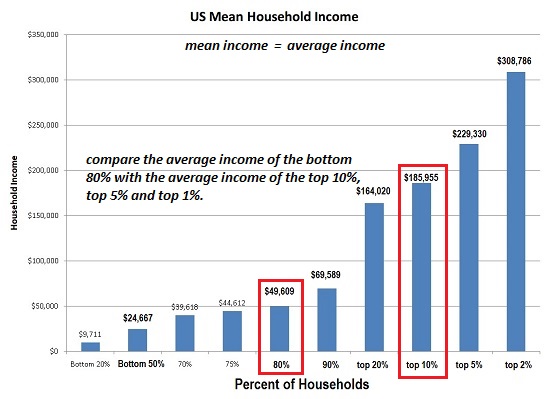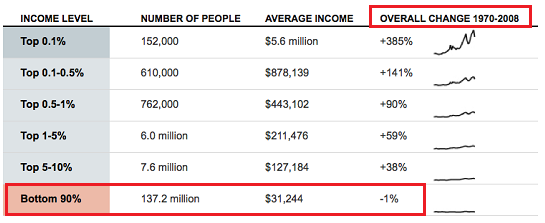We're Fragmenting Because our Experience of the Economy Is Fragmenting
July 5, 2017
The technocrat and capital-owning class is delighted with the economy, and can't understand why everyone isn't prospering.
You've probably seen some version of this chart of average household income in America before. (You may have seen charts of median household income as well; here's an article on the difference between the two methods of measurement: American families are learning the difference between median and mean)
Here's the data in table format, if you prefer: Household Income Quintiles.
The point is that there is an enormous difference between the average household incomes of the bottom 80% and the top 10%, 5% and 1%. It's important to separate the various income brackets, as including the top households distorts the average. Here we see the average household income of the bottom 80% of households is around $50,000, while the average income of the top 10% (which includes the wealthy 1% and the super-wealthy .1%) is almost four times greater: $185,000.

You've probably seen a version of this chart, too, which shows that the real (inflation adjusted) income of the bottom 90% has gone nowhere for the past 40+ years.

While the mainstream wrings its hands over the political and social fragmentation that is visible everywhere, it ignores the economic fragmentation that's the source: we're fragmenting because our experience of our economy and society is fragmenting.
In the good old days of secular growth of everything--energy consumption, wages, profits, employment, government spending, consumer debt, housing construction, business investment and consumer spending--people in every economic class shared a common experience that the financial future of their household was improving.
The economic pie was expanding, and everyone's slice was getting bigger--some more than others, of course, but there was enough trickling down to expand almost everyone's share of the economy.
That is no longer true. Those in the top 5% live in an entirely different economy than the bottom 80%. If we combine the higher incomes with the rising wealth of the top slice of households, we get an even starker picture of fragmentation.
Those in the bottom 50% live in a different economy than those between 80% and 90%--households that are holding their own--and those in the top 10% that are seeing their income and wealth advance.
The top 5% and above live in a different economy than those between 80% and 95%, as they are seeing their wealth and income rise sharply, even spectacularly if they own the "right" assets and income streams.
Those with gold-plated healthcare insurance live in a completely different world than those with huge deductibles. Those on Medicaid live in a more secure world than those with marginal private-sector coverage.
Households with two secure incomes have a completely different experience of the economy than those with insecure incomes that fluctuate from year to year.
Those who own their homes free and clear have a different reality from those struggling to pay massive mortgages and property taxes.
Those enjoying ample pensions from their federal, state and county/city employment live in a different world than those scraping by on Social Security.
We live in an economy of haves and have-nots, and the ladder between those earning $2,000 a month and those earning $20,000 a month has very few rungs. The pie is shrinking for the vast majority of households, nibbled away by inflation (supposedly near-zero), higher deductibles, fees, taxes, fines, interest and on and on.
The technocrat and capital-owning class is delighted with the economy, and can't understand why everyone isn't prospering. Their experience of the economy is that's it's pretty darn amazing and wonderful.
This class dominates the state, the corporate media, the philanthro-capitalist non-profit sector, and the think-tank and academic sectors (I'm not rich, look at the dust on my BMW, Tesla, etc.). As a result, their cluelessness is the dominant narrative.
Our experience of the economy and of social/financial mobility has fragmented, and
social and political fragmentation are the inevitable consequence.
If you found value in this content, please join me in seeking solutions by
becoming
a $1/month patron of my work via patreon.com.
Check out both of my new books, Inequality and the Collapse of Privilege ($3.95 Kindle, $8.95 print) and Why Our Status Quo Failed and Is Beyond Reform ($3.95 Kindle, $8.95 print, $5.95 audiobook) For more, please visit the OTM essentials website.
NOTE: Contributions/subscriptions are acknowledged in the order received. Your name and email remain confidential and will not be given to any other individual, company or agency.
|
Thank you, Stephanie and Mark V-K. ($12.50), for yet another splendidly generous contribution to this site -- I am greatly honored by your steadfast support and readership. |
Thank you, Regina T. ($20), for renewing your extremely generous contribution to this site -- I am greatly honored by your support and readership. |

Discover why Iím looking to retire in a SE Asia luxury resort for $1,200/month. |